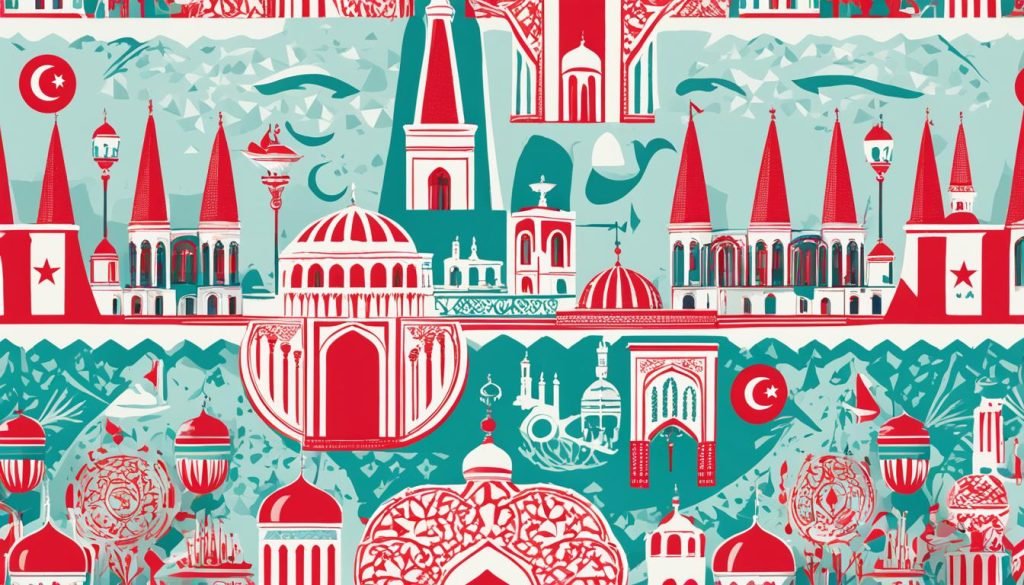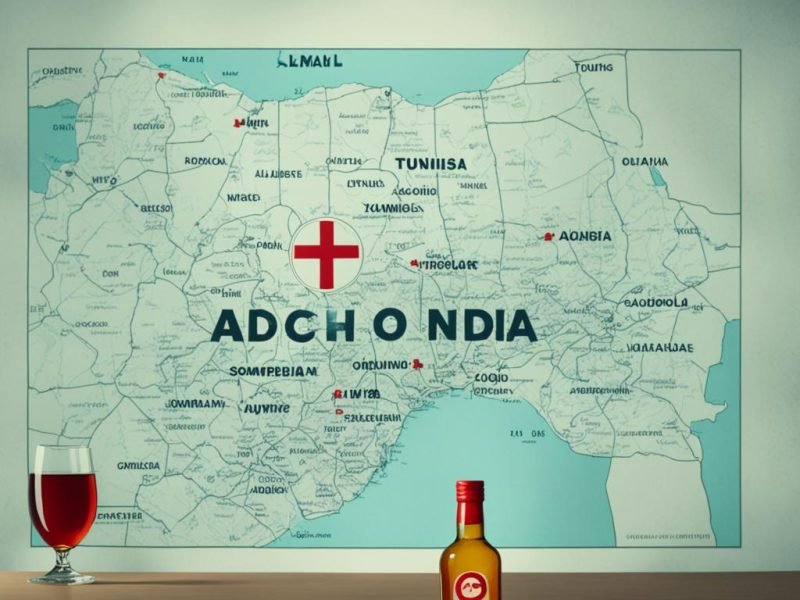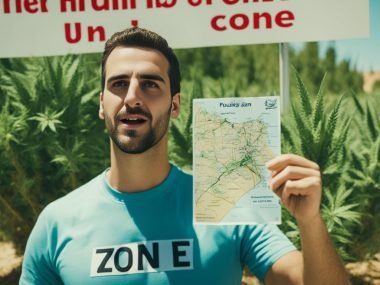As I walk through Tunisia’s sunny streets, I’m greeted by a blend of smells, sights, and sounds. This mix creates a picture of a place full of culture and history. Yet, a common question comes to mind for many visitors: Can You Drink Alcohol In Tunisia? Tunisia finds itself balancing modern beliefs and its Muslim-majority background, giving us a look at its alcohol laws.
Under the Mediterranean sun, I’ve thought about how alcohol rules in Tunisia affect both tourists and locals. The country shares stories of old civilisations and today’s values. From busy cities with their restaurants to the calm countryside, Tunisia’s alcohol laws create a picture as detailed as the mosaics in its mosques.
Key Takeaways
- Tunisia permits the sale and consumption of alcohol with certain regulations in place.
- The legal drinking age in Tunisia is 21, an important facet for visitors to remember.
- Alcohol laws in Tunisia reflect a balance between the country’s Muslim heritage and current societal norms.
- While alcohol is accessible, its availability is predominantly concentrated in tourist areas and urban centres.
- Travellers should be mindful of Tunisian culture and religious practices when consuming alcohol.
- Understanding and respecting local laws and customs ensures a respectful and enjoyable visit.
Overview of Tunisian Alcohol Regulations
Understanding the alcohol laws in Tunisia gives us a peek into a nation where old and new mix. Tunisia, mostly Muslim, has unique rules and social views about drinking alcohol in Tunisia rules. Knowing these regulations requires an understanding of the nation’s laws, and the cultural and religious influences at play.
The Legal Drinking Age in Tunisia
To legally drink alcohol in Tunisia, you must be 21. This rule lets adults buy and enjoy alcoholic drinks responsibly. It aims to control alcohol access among young people. As a visitor, it’s crucial to respect this rule.
Tunisian Legislation on Alcohol Sale and Consumption
The rules about selling and drinking alcohol in Tunisia balance global norms and local traditions. Authorised places like bars, restaurants, and tourist-focused hotels can serve alcohol. Yet, outside these places, there may be stricter rules, reflecting the nation’s religious values.
Impact of Tunisian Culture and Religion on Alcohol Laws
Islam shapes the alcohol laws in Tunisia greatly. This influence is seen in everyday life and how alcohol is viewed and drunk around Tunisia. In less touristy areas, public drinking might be seen badly, showing the country’s varied attitudes. Understanding local culture and religion is key to knowing where you can enjoy a drink.
Navigating the Tunisian Drinking Scene
The Tunisian drinking culture stands out with its own special patterns. It’s shaped by the country’s heritage and values. To really enjoy a drink here, it’s important to understand these local norms. I’ll help you navigate through the cities and quieter countryside. I’ll also cover the key points of drinking manners in this part of North Africa.
Where to Find Alcohol in Tunisia
Finding a drink in Tunisia varies by location. In cities like Tunis, Sousse, and Hammamet, bars and hotels welcome guests with a variety of drinks. These places are perfect for both tourists and locals looking to enjoy the night. Here, you can dive into Tunisia’s lively side.
Alcohol Availability in Urban Versus Rural Areas
However, it’s a different story in the countryside. In rural areas, traditions and religious beliefs are stronger. This makes finding alcohol more difficult. Taverns are rare, and places that do serve drinks tend to be quite hidden.
| Location | Alcohol Availability | Noteworthy Establishments |
|---|---|---|
| Urban Areas (e.g., Tunis) | High | Lively bars and luxury hotels |
| Rural Areas | Low | Selected local shops and inns |
| Tourist Hotspots | High | Resorts and tourist-focused venues |
Understanding the Etiquette of Drinking in Public
Enjoying Tunisia’s nightlife calls for respectful behavior. It’s important to be discreet, especially outside tourist areas. On Fridays, many places don’t sell alcohol due to the Islamic holy day. By respecting local customs, you can enjoy Tunisian drinks without causing any upset.
The History of Alcohol in Tunisia
Exploring Tunisia’s history uncovers a long past of alcohol production and consumption. These traditions date back to before the Romans came. Around 2000 years ago, during the Punic age, wine was already popular. It has played a key role in Tunisia’s culture ever since.
Today, Tunisia’s approach to alcohol respects its historical roots. The question of is alcohol allowed in Tunisia is not simple. It’s about well-thought-out rules rather than a strict yes or no.
The Celtia brewery is a prime example of alcohol’s role in Tunisian life. Owned and run by the state, it shows how alcohol is part of society. This is despite Islam’s general stance against alcohol. The brewery thrives, showing a thoughtful acceptance.
| Alcoholic Beverage | Origin | Significance in Tunisian Culture |
|---|---|---|
| Wine | Punic Era | Symbolises historic winemaking traditions |
| Celtia Beer | Modern Era | Represents state-endorsed production |
| Local Spirits | Various Periods | Embodies Tunisia’s diverse alcohol heritage |
Interestingly, the moderate Islamist party Ennahda did not ban alcohol while in power. Instead, they showed a tolerance. This highlights alcohol’s important cultural role, even amid potential conflict.

The story of Tunisian alcohol policy showcases a balance between old and new, religion and social life. Tunisia’s long history with alcohol enriches its current policies and views. My exploration unveils a detailed and fascinating picture of alcohol in Tunisia’s heart.
Tunisian Alcoholic Beverages and Traditions
Tunisia’s culture is rich, and its Tunisian alcoholic beverages play a big part. These drinks range from beers to exotic spirits. They reflect the country’s culinary diversity and long-standing traditions.
Celtia: Tunisia’s Staple Beer
Celtia is a favorite beer in Tunisia. It is refreshing and fits well with the warm Mediterranean weather. This beer symbolizes Tunisia’s brewing tradition. It is a popular choice for those looking to cool down.
Local Spirits: From Boukha to Cedratine
The world of local spirits in Tunisia is vibrant with choices like Boukha and Cedratine. Boukha is a powerful spirit made from Tunisian figs. Cedratine, a lemon liqueur, is sweet and tangy. It can be enjoyed before or after a meal.
Winemaking: A Tradition Dating Back to the Punic Era
Winemaking in Tunisia is an ancient art dating to the Punic era. Tunisian vineyards produce many wines, such as Syrah and Chardonnay. The country makes about 40 million bottles of wine yearly. This shows its deep-rooted winemaking tradition.
We can compare some popular Tunisian wines:
| Wine Variety | Taste Notes | Region |
|---|---|---|
| Chardonnay | Crisp, with hints of citrus and white fruit | Cap Bon Peninsula |
| Syrah | Rich and spicy with berry undertones | Mornag |
| Muscat of Alexandria | Sweet and floral, perfect for desserts | Kelibia |
Enjoying these drinks is like tasting history itself. Each sip reveals a part of Tunisia’s rich past and present.
Can Tourists Drink Alcohol In Tunisia?
If you’re wondering about Tunisia alcohol consumption regulations, it’s important for travellers wanting a drink. It’s good to know that tourists can indeed enjoy alcohol in Tunisia. Yet, you must follow the local customs and laws strictly.
In Tunisia, places like hotels and resorts serve a wide range of drinks to tourists. You can try everything from popular global brands to local Tunisian drinks. Offering alcohol in this way respects the culture and religion of the country.
- Local beers—reflecting Tunisia’s brewing prowess
- Internationally recognised brands—for those favouring familiar tastes
- Traditional spirits—providing a genuine taste of Tunisian history
Enjoying the freedom to drink also means respecting Tunisian customs and norms. This approach helps create a friendly environment. It’s all about appreciating Tunisia’s relaxed alcohol rules while being culturally sensitive.
Exploring Tunisia shows the blend of modern pleasures with traditional values. This blend makes Tunisia welcoming for tourists who drink responsibly. By following the Tunisia alcohol consumption regulations, visitors can fully enjoy their stay in Tunisia.
Tunisian Drinking Culture and Societal Views
In my exploration as a journalist, it’s clear Tunisian drinking culture reflects diverse attitudes towards alcohol. Places like Tunis and Sousse show a more open approach. Yet, conservative areas, influenced by Islamic beliefs, disagree with the easy access to alcohol. These opposing views create a deep conversation about alcohol restrictions in Tunisia.

My findings reveal that opinions on alcohol greatly vary across age, place, and faith. Let’s dive deeper into these societal views, shall we?
Perception of Alcohol among Different Societal Groups
Near the sea, where modernity breathes freely, the drinking culture is quite open. Taverns and diners here serve drinks as a norm. But, move to the rural areas, and the mood shifts. There, traditions dictate life and thoughts on alcohol are stricter. This splits the country’s views on alcohol restrictions.
Recent Changes in Tunisian Society Regarding Alcohol
Post-revolution, Tunisia is experiencing newfound freedoms. This includes changing views on alcohol. The political changes add to the debate. From my talks with locals, I see a nation cautiously embracing change, testing it against old values.
From witnessing wine production in the vineyards to young people questioning norms, Tunisia’s alcohol relationship is complex and changing. The ongoing talks on alcohol restrictions and culture show Tunisia’s lively and diverse nature.
Alcohol Consumption and Tourism in Tunisia
When I explored Tunisia, I discovered the big role alcohol plays in tourism. It’s more than just drinking. It mixes with Tunisia’s culture and history to give tourists a full experience. We can’t ignore the Tunisia alcohol consumption regulations. They help the tourism industry thrive while keeping local customs in mind.
The Role of Alcohol in Tunisian Tourism
For many visitors, tasting local food and drinks is key to their trip. There are rules to let tourists can drink alcohol in Tunisia safely. This ensures visitors enjoy Tunisia’s traditions and customs without trouble. The lively nightlife and elegant resorts in Tunisia offer a slice of Mediterranean fun. They provide a place to enjoy drinks while respecting the culture.
Unique Drinking Experiences for Tourists
Looking to connect with Tunisian traditions, tourists love the wine tastings at old vineyards. It pays homage to Tunisia’s long history of wine-making. Then, historic cafes offer mint tea, inviting you to relax. Olive oil tasting events show off the area’s rich agriculture. These activities do more than just please the taste buds. They are part of Tunisia’s legacy. They show how can tourists drink alcohol in Tunisia ties into celebrating both old traditions and new times.
Tips for Responsible Drinking in Tunisia
Understanding responsible drinking in Tunisia keeps you safe and respects local culture. It’s important to follow Tunisia’s alcohol laws. Here are essential tips for visitors:
- Check the legal drinking age and always follow this rule.
- Learn about local customs, especially during Ramadan and religious festivals. Alcohol might not be welcome then.
- Understand the place where you’re drinking. Some have stricter rules.
- Never drink and drive. Tunisia’s laws on this are very strict.
Remember, responsible drinking in Tunisia involves more than just how much you drink. It’s also about where and when you drink.
Worried about drinking too much? Keep an eye on how much you drink and set a limit. Drinking water and eating can also make your time better.
Below is a table with important points for responsible drinking in Tunisia:
| Aspect | Consideration |
|---|---|
| Legal Drinking Age | 21 and above |
| Drinking During Ramadan | Advised against in public spaces |
| Etiquette in Establishments | Follow local customs; dress codes or other rules may apply |
| Public Intoxication | Strongly discouraged, with legal consequences |
Being mindful of these points helps you follow Tunisia’s alcohol laws. This ensures a good stay. Whether you enjoy a Celtia beer or Tunisia’s wines, drink responsibly for a great experience.
Challenges and Controversies Surrounding Alcohol in Tunisia
Exploring Tunisia’s alcohol consumption regulations reveals much about society. It’s not just about laws. It shows how society’s views and values are changing after the revolution. The debate on alcohol restrictions tells us about the balance between tradition and change. In this discussion, I’ll cover the debates and point out key events that show the tension about drinking alcohol in Tunisia.
Political and Social Debates on Alcohol Consumption
In Tunisia, politics is buzzing with talks about alcohol. There are those who want fewer restrictions on drinking. They clash with those wanting stricter rules. This conflict triggers my interest, making me look into each viewpoint. These debates shape how people see and act about alcohol, beyond just politics.
Incidents and Tensions Involving Alcohol in Recent Years
Recently, tensions showed through acts against liquor shops and bars. These reflect the deep divide in views about alcohol. Such events catch the public’s eye. They make everyone, from leaders to everyday folks, think about Tunisia’s alcohol rules.
Below, a table shows the different views and actions of those for and against relaxed alcohol policies in Tunisia:
| Stakeholder Group | Viewpoint | Advocated Action | Impact on Society |
|---|---|---|---|
| Progressives | Favourable toward liberal alcohol policies | Promotion of individual rights and tourism | Engagement with global tourism and multicultural integration |
| Conservatives | Supportive of strict alcohol restrictions | Enforcement of conservative values, including interventions at alcohol-selling venues | Reinforcement of traditional beliefs and potential conflict with progressive elements |
| Government | Balancing approach | Moderation between liberal policies and conservative demands | A continual quest for social harmony and national stability |
Reflecting on this, it’s clear that these conflicts and mix of beliefs shape Tunisia today. In looking into Tunisia’s approach to alcohol, it’s like uncovering a tapestry. This tapestry is made of history, culture, and beliefs. It shows us not just the laws but the soul of the nation.
Conclusion
“Can You Drink Alcohol In Tunisia?” was our opening query. We’ve found that yes, you can, but within Tunisia’s strict rules. Knowing that the legal age for drinking is 21 is crucial for tourists. This fact ensures a respectful visit to Tunisia.
Tunisia’s journey with alcohol, from its famous Celtia beer to its wine heritage, is fascinating. This history is integral to Tunisia’s identity. Yet, the nation is not stuck in the past. It balances tradition with modernity brilliantly.
In its path after the revolution, Tunisia shows how it manages tradition and progress. The conversations about alcohol reflect these challenges. If you’re visiting, understanding these cultural nuances will enhance your experience.







